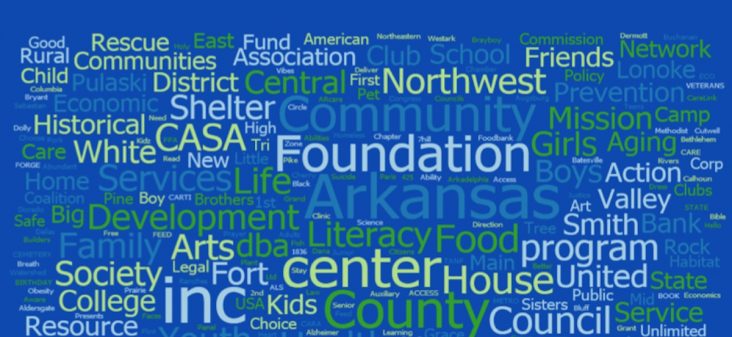Report: Nonprofits see decline in giving, struggle with collaboration
by November 12, 2018 4:53 pm 1,448 views

Declining contributions and rising competition could change the way nonprofit organizations (NPOs) can reach those in need in Arkansas, according to a report released Monday (Nov. 12) by The Arkansas Community Foundation, Carl B. and Florence E. King Foundation and Winthrop Rockefeller Foundation.
According to the study completed by Communities Unlimited, Arkansas NPOs receive $1.5 billion in annual contributions, and yet are facing declining contributions from individuals, corporations and state and federal entities. Though Arkansans are generous givers, the study states, across the nation individual giving has dropped 10% since 2000.
“Funding from state and federal governments has decreased, and changes in the tax code are squeezing corporate giving,” the study said, further indicating that nonprofits in Arkansas are also need volunteers, supporters, and board members. “Without increased investment of time, talent, and treasure, they cannot keep up with the needs of their communities.”
Requirements on how monies are used that are included with most grants further limit the funding many state nonprofits need, the study said. NPO leaders also reported a “sense of competition” for the limited resources, the study said. Though coordination and collaboration between competing nonprofits could help in some instances, there is a concern it will not work.
“Collaboration can lead to shared resources and ultimately being more effective,” said Sarah Kinser, chief program officer with the Arkansas Community Foundation. “But that takes time and that takes people.”
Both of those commodities are not necessarily something NPOs can afford to devote to the task of collaboration when everyone is working so hard to do their mission, Kinser said. Thus, funders have to give organizations the means and support to make themselves stronger, she added.
“Another theme related to competition was that collaboration to meet capacity-development needs by, for example, sharing grant writing resources/staff, was not possible as ‘you could never be certain that (your organization) was getting their best effort if two of us are competing for the same grant,’” the study stated.
Other issues arise with concern to capacity development. The biggest capacity development need, noted by leaders involved in the study, was fundraising.
“If I could find someone to write grants, even someone I could train, we could look for more funding. But I don’t have the funds to hire/train that person,” one respondent was quoted in the study.
Issues with funds come from lack of access to and availability of funding; increased difficulty finding grants for which they or their services are eligible; diminishing donor bases and lack of knowledgeable and experienced staff, the study said. The report stated that “government agencies recently accounted for 29% of nonprofit funding, but federal and state budgets are being reduced for programs nonprofits are expected to deliver.”
This lack of funding is also a contributing factor for the second greatest challenge faced by NPOs — not having enough staff or volunteers. Being able to pay competitive salaries was the No. 1 staffing challenge reported by NPOs in 2012-2016, the study stated.
“Nonprofits help empower Arkansas families to move beyond poverty to prosperity,” said Sherece Y. West-Scantlebury, president and CEO of the Winthrop Rockefeller Foundation. “With this study, we hope to better understand how we can support these organizations and their leadership to enact long-lasting change.”
There are more than 14,000 NPOs in Arkansas. The organizations employ more than 90,000 and generate $17 billion in annual revenue. The report said key aspects to help the organizations include educational workshops, regional collaboration, fundraising tools and enhanced grant-writing support.
“For a long time nonprofits are graded on their operating costs as to how good a steward they are of the monies. And of course, that needs to be part of it. But if you only look at that as a barometer, we’re missing how they can become stronger and better able to serve if they are not allowed to invest back in themselves,” Kinser said. “(Our NPOs) need unrestricted support in order to not just live day to day but to continue meeting the needs and to become stronger.”
